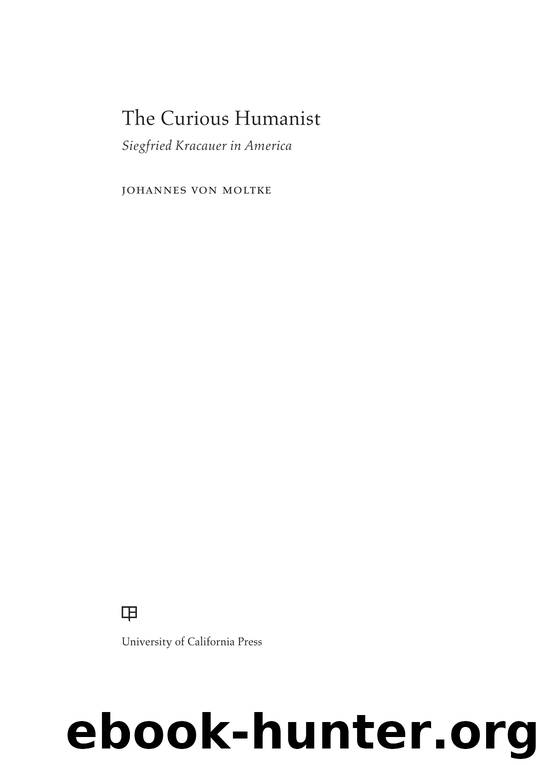The Curious Humanist by von Moltke Johannes;

Author:von Moltke, Johannes;
Language: eng
Format: epub
Publisher: University of California Press
PAISAN: A PARADIGMATIC FILM
The average spectator knows more about reality than is offered him in our movie houses. It should be the other way round.
SIEGFRIED KRACAUER, “The Mirror Up to Nature”
Kracauer’s work during the New York years communicates closely with Warshow’s, whether through editorial comment or explicit reference. The two men had been in contact about various articles that Kracauer proposed to Commentary, and they even appear to have competed for space to write on film in the pages of Partisan Review.60 As both their published and unpublished writings of the time indicate, the two men shared an intense interest in the cultural landscape of their day, which—again unlike their more unabashedly Europhile and avant-garde-minded colleagues—they found to be mapped most clearly in the movies. From Chaplin to Italian Neorealism, Kracauer and Warshow reviewed the same films and books on the cinema. Problems of realism and alienation figured centrally among these; but it is the fate of experience that, as we have seen, constituted the starting point for Warshow’s work. It was also a recurring theme in Kracauer’s essays from the 1940s, and in Theory of Film it emerges as the book’s conceptual telos.
If, as I will argue, Kracauer’s elaboration of the relationship between film and experience was ultimately more nuanced than Warshow’s, this may have had to do partly with the more occasional style of the latter’s articles compared to Kracauer’s long-gestating, magisterial book on film aesthetics; and one can only wonder how the dialogue might have developed had Warshow lived to work out his proposed book for the Guggenheim grant and see the publication of Theory of Film. For all their differences, Warshow and Kracauer let themselves be guided by a profound cinephilia that helped them illuminate the utopian and redemptive qualities of the movies.61 The two authors shared the diagnosis of the reification of experience—whether at the hands of ideology and opinion-mongering, as Warshow claimed, or, as we shall see in Kracauer’s case, as the fallout of scientific progress and some more generalized notion of abstraction, behind which lingered the experience of the loss of experience under totalitarianism. Similarly, both critics harbored a belief that one could reconnect to this lost experience and gather up its shards within popular culture and at the movies. The route to this redemption, for Warshow as for Kracauer, was film, and realism in particular—whether in the form of the gangster film or the western with its open plains and its parti pris for the Davids over the Goliaths;62 in the found story or the episode; or even in actors like Gary Cooper and Gregory Peck who “are in themselves, as material objects, ‘realistic,’ seeming to bear in their bodies and their faces mortality, limitation, the knowledge of good and evil.”63
The convergence of Kracauer’s and Warshow’s critical sensibilities manifests even where the two authors disagree on a given film or filmmaker, as in the case of Rossellini’s Paisan. Composed of six loosely connected episodes, this film about the gradual liberation of Italy
Download
This site does not store any files on its server. We only index and link to content provided by other sites. Please contact the content providers to delete copyright contents if any and email us, we'll remove relevant links or contents immediately.
The Rules Do Not Apply by Ariel Levy(4520)
Bluets by Maggie Nelson(4258)
Too Much and Not the Mood by Durga Chew-Bose(4087)
Pre-Suasion: A Revolutionary Way to Influence and Persuade by Robert Cialdini(3973)
The Motorcycle Diaries by Ernesto Che Guevara(3778)
Walking by Henry David Thoreau(3681)
What If This Were Enough? by Heather Havrilesky(3195)
Schaum's Quick Guide to Writing Great Short Stories by Margaret Lucke(3182)
The Daily Stoic by Holiday Ryan & Hanselman Stephen(3104)
The Day I Stopped Drinking Milk by Sudha Murty(3102)
Why I Write by George Orwell(2771)
The Social Psychology of Inequality by Unknown(2758)
Letters From a Stoic by Seneca(2669)
A Short History of Nearly Everything by Bryson Bill(2503)
Insomniac City by Bill Hayes(2391)
Feel Free by Zadie Smith(2378)
A Burst of Light by Audre Lorde(2346)
Upstream by Mary Oliver(2272)
Behave: The Biology of Humans at Our Best and Worst by Robert M. Sapolsky(2168)
